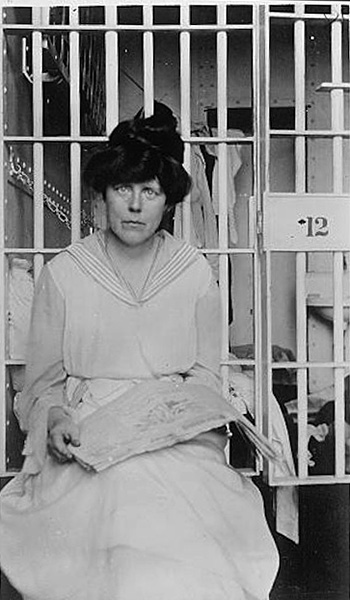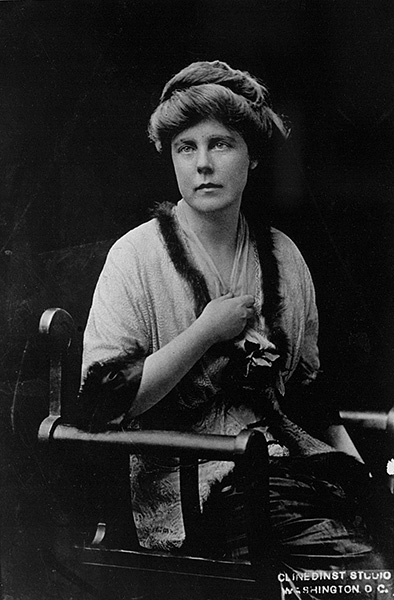 print preview
print previewback 1917 SUITE | SILENT SENTINELS AND THE NIGHT OF TERROR
VOICES FROM OCCOQUAN
Excerpts of Lucy Burns’s Scraps of Paper with Commentary by Doris Stevens
reprinted from Jailed for Freedom, Doris Stevens, 1920
The day following their commitment to Occoquan Mr. O’Brien, of counsel, was directed to see the women, to ascertain their condition. Friends and relatives were alarmed, as not a line of news had been allowed to penetrate to the world. Mr. O’Brien was denied admission and forced to come back to Washington without any report whatsoever.
The next day Mr. O’Brien again attempted to see his clients, as did also the mother of Miss Matilda Young, the youngest prisoner in Mr. Whittaker’s care, and Miss Katherine Morey, who went asking to see her mother. Miss Morey was held under armed guard half a mile from the prison. Admission was denied to all of them.
The terrible anxiety at Headquarters was not relieved the third day by a report brought from the workhouse by one of the marines stationed at Quantico Station, Virginia, who had been summoned to the workhouse on the night the women arrived. He brought news that unknown tortures were going on.
Mr. O’Brien immediately forced his way through by a court order, and brought back to Headquarters the astounding news of the campaign of terrorism which had started the moment the prisoners had arrived, and which was being continued at that moment. Miss Lucy Burns, who had assumed responsibility for the welfare of the women, had managed to secrete small scraps of paper and a tiny pencil, and jot down briefly the day by day events at the workhouse.
This week of brutality, which rivaled old Russia, if it did not outstrip it, was almost the blackest page in the Administration’s cruel fight against women.
Here are some of the scraps of Miss Burns’ day-by-day log, smuggled out of the workhouse. Miss Burns is so gifted a writer that I feel apologetic for using these scraps in their raw form, but I know she will forgive me.
Wednesday, November 14. Demanded to see Superintendent Whittaker. Request refused. Mrs. Herndon, the matron, said we would have to wait up all night. One of the men guards said he would “put us in sardine box and put mustard on us.”
Superintendent Whittaker came at 9 p.m. He refused to hear our demand for political rights. Seized by guards from behind, flung off my feet, and shot out of the room.
All of us were seized by men guards and dragged to cells in men’s part. Dorothy Day was roughly used—back twisted. Mrs. Mary A. Nolan (73-year-old picket from Jacksonville, Florida) flung into cell. Mrs. Lawrence Lewis shot past my cell. I slept with Dorothy Day in a single bed. I was handcuffed all night and manacled to the bars part of the time for asking the others how they were, and was threatened with a straitjacket and a buckle gag.
Thursday, November 16. . . . Asked for Whittaker, who came. He seized Julia Emory by the back of her neck and threw her into the room very brutally. She is a little girl. I asked for counsel to learn the status of the case. I was told to “shut up,” and was again threatened with a straitjacket and a buckle gag. Later I was taken to put on prison clothes, refused and resisted strenuously. I was then put in a room where delirium tremens patients are kept.
Lucy Burns at Occoquan Workhouse
Lorton, Virginia, November 1917.
On the seventh day, when Miss Lucy Burns and Mrs. Lawrence Lewis were so weak that Mr. Whittaker feared their death, they were forcibly fed and taken immediately to the jail in Washington. Of the experience Mrs. Lewis wrote:—
I was seized and laid on my back, where five people held me, a young colored woman leaping upon my knees, which seemed to break under the weight. Dr. Gannon then forced the tube through my lips and down my throat, I gasping and suffocating with the agony of it.
I didn’t know where to breathe from and everything turned black when the fluid began pouring in. I was moaning and making the most awful sounds quite against my will, for I did not wish to disturb my friends in the next room.
Finally the tube was withdrawn. I lay motionless. After a while I was dressed and carried in a chair to waiting automobile, laid on the back seat and driven into Washington to the jail hospital. Previous to the feeding I had been forcibly examined by Dr. Gannon, I struggling and protesting that I wished a woman physician.
Of this experience, Miss Burns wrote on tiny scraps of paper:
Wednesday, 12 m. Yesterday afternoon at about four or five, Mrs. Lewis and I were asked to go to the operating room. Went there and found our clothes. Told we were to go to Washington. No reason as usual. When we were dressed, Dr. Gannon appeared, and said he wished to examine us. Both refused. Were dragged through halls by force, our clothing partly removed by force, and we were examined, heart tested, blood pressure and pulse taken. Of course such data was of no value after such a struggle.
Dr. Gannon told me then I must be fed. Was stretched on bed, two doctors, matron, four colored prisoners present, Whittaker in hall. I was held down by five people at legs, arms, and head. I refused to open mouth. Gannon pushed tube up left nostril. I turned and twisted my head all I could, but he managed to push it up. It hurts nose and throat very much and makes nose bleed freely. Tube drawn out covered with blood. Operation leaves one very sick. Food dumped directly into stomach feels like a ball of lead.
Left nostril, throat and muscles of neck very sore all night. After this I was brought into the hospital in an ambulance. Mrs. Lewis and I placed in same room. Slept hardly at all. This morning Dr. Ladd appeared with his tube. Mrs. Lewis and I said we would not be forcibly fed. Said he would call in men guards and force us to submit. Went away and we were not fed at all this morning. We hear them outside now cracking eggs.
Lucy Burns
Clinedinst Studio Photography
Washington, D.C., c. 1913
With Miss Burns and Mrs. Lewis, who were regarded as leaders in the hunger strike protest, removed to the district jail, Mr. Whittaker and his staff at Occoquan began a systematic attempt to break down the morale of the hunger strikers. Each one was called to the mat and interrogated.
“Will you work?”—“Will you put on prison clothes?”—“Will you eat?”—“Will you stop picketing?”—“Will you go without paying your fine and promise never to picket again?”
How baffled he must have been! The answer was definite and final. Their resistance was superb. ![]()
Silent Sentinels and the Night of Terror
Introduction & Table of Contents
Voices from Occoquan
Introduction & Table of Contents
1917 Suite: A Month, a Year, a Term of Liberty
Introduction & Cross-issue Table of Contents

